Financial Accounting Theory and Practice: AI and Blockchain
VerifiedAdded on 2023/06/08
|9
|2142
|419
Essay
AI Summary
This essay explores the integration of Artificial Intelligence (AI) and blockchain technology within the realm of financial accounting, examining their current applications and potential future impact. It presents instances where AI, such as the Pegg application, streamlines accounting processes by automating invoice management and expense tracking, while blockchain technology facilitates secure and transparent transaction validation across supply chains. The essay argues that AI and blockchain offer opportunities for auditors to enhance efficiency and data analysis capabilities, rather than posing a threat to the accounting profession. It also addresses how these technological advancements are influencing financial reporting regulations, promoting improved stakeholder collaboration and transparency, concluding that AI and blockchain are valuable tools for accountants to classify and summarize information effectively, leading to a more transparent and efficient audit process. Desklib offers a wealth of similar resources for students.
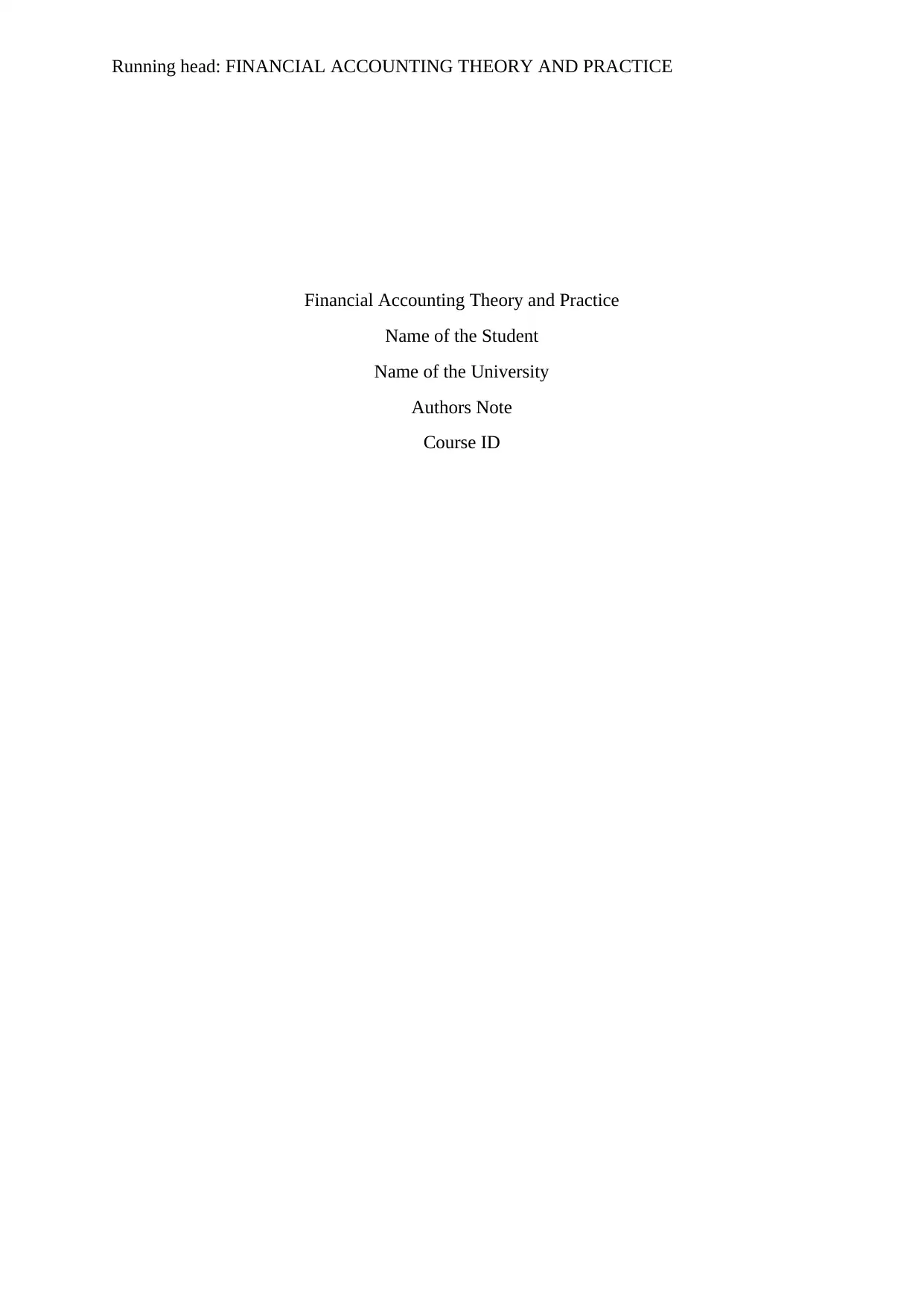
Running head: FINANCIAL ACCOUNTING THEORY AND PRACTICE
Financial Accounting Theory and Practice
Name of the Student
Name of the University
Authors Note
Course ID
Financial Accounting Theory and Practice
Name of the Student
Name of the University
Authors Note
Course ID
Paraphrase This Document
Need a fresh take? Get an instant paraphrase of this document with our AI Paraphraser
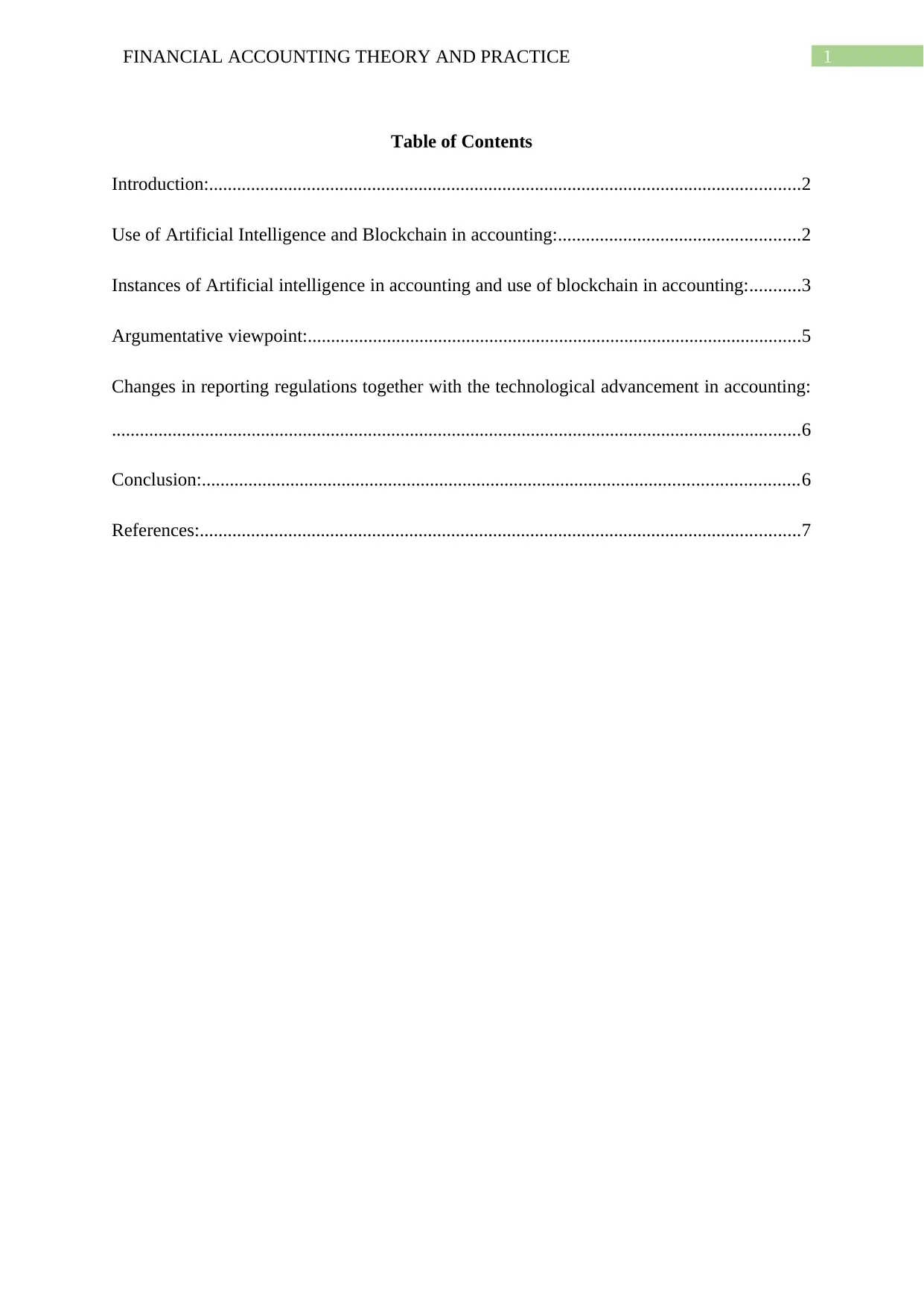
1FINANCIAL ACCOUNTING THEORY AND PRACTICE
Table of Contents
Introduction:...............................................................................................................................2
Use of Artificial Intelligence and Blockchain in accounting:....................................................2
Instances of Artificial intelligence in accounting and use of blockchain in accounting:...........3
Argumentative viewpoint:..........................................................................................................5
Changes in reporting regulations together with the technological advancement in accounting:
....................................................................................................................................................6
Conclusion:................................................................................................................................6
References:.................................................................................................................................7
Table of Contents
Introduction:...............................................................................................................................2
Use of Artificial Intelligence and Blockchain in accounting:....................................................2
Instances of Artificial intelligence in accounting and use of blockchain in accounting:...........3
Argumentative viewpoint:..........................................................................................................5
Changes in reporting regulations together with the technological advancement in accounting:
....................................................................................................................................................6
Conclusion:................................................................................................................................6
References:.................................................................................................................................7
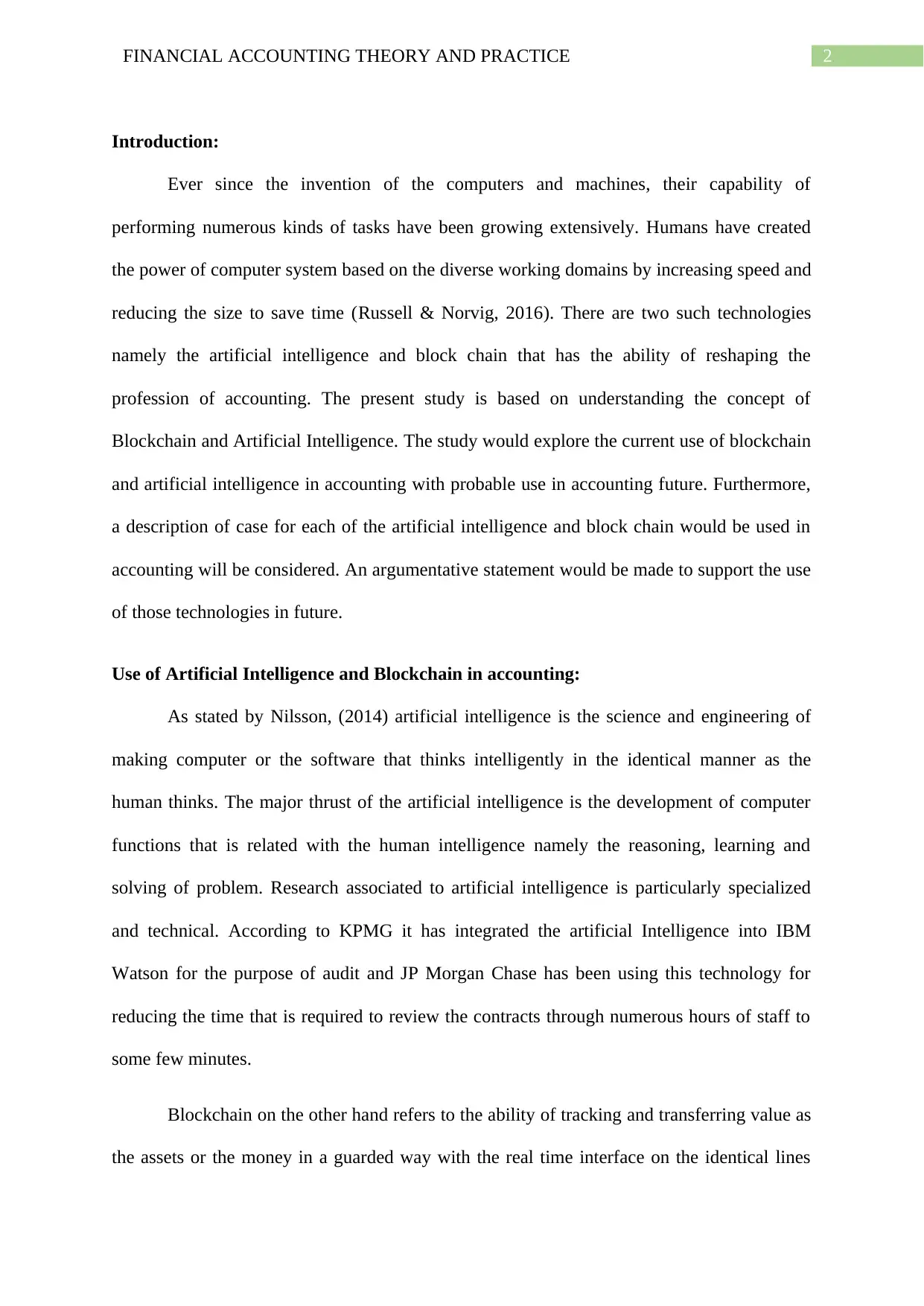
2FINANCIAL ACCOUNTING THEORY AND PRACTICE
Introduction:
Ever since the invention of the computers and machines, their capability of
performing numerous kinds of tasks have been growing extensively. Humans have created
the power of computer system based on the diverse working domains by increasing speed and
reducing the size to save time (Russell & Norvig, 2016). There are two such technologies
namely the artificial intelligence and block chain that has the ability of reshaping the
profession of accounting. The present study is based on understanding the concept of
Blockchain and Artificial Intelligence. The study would explore the current use of blockchain
and artificial intelligence in accounting with probable use in accounting future. Furthermore,
a description of case for each of the artificial intelligence and block chain would be used in
accounting will be considered. An argumentative statement would be made to support the use
of those technologies in future.
Use of Artificial Intelligence and Blockchain in accounting:
As stated by Nilsson, (2014) artificial intelligence is the science and engineering of
making computer or the software that thinks intelligently in the identical manner as the
human thinks. The major thrust of the artificial intelligence is the development of computer
functions that is related with the human intelligence namely the reasoning, learning and
solving of problem. Research associated to artificial intelligence is particularly specialized
and technical. According to KPMG it has integrated the artificial Intelligence into IBM
Watson for the purpose of audit and JP Morgan Chase has been using this technology for
reducing the time that is required to review the contracts through numerous hours of staff to
some few minutes.
Blockchain on the other hand refers to the ability of tracking and transferring value as
the assets or the money in a guarded way with the real time interface on the identical lines
Introduction:
Ever since the invention of the computers and machines, their capability of
performing numerous kinds of tasks have been growing extensively. Humans have created
the power of computer system based on the diverse working domains by increasing speed and
reducing the size to save time (Russell & Norvig, 2016). There are two such technologies
namely the artificial intelligence and block chain that has the ability of reshaping the
profession of accounting. The present study is based on understanding the concept of
Blockchain and Artificial Intelligence. The study would explore the current use of blockchain
and artificial intelligence in accounting with probable use in accounting future. Furthermore,
a description of case for each of the artificial intelligence and block chain would be used in
accounting will be considered. An argumentative statement would be made to support the use
of those technologies in future.
Use of Artificial Intelligence and Blockchain in accounting:
As stated by Nilsson, (2014) artificial intelligence is the science and engineering of
making computer or the software that thinks intelligently in the identical manner as the
human thinks. The major thrust of the artificial intelligence is the development of computer
functions that is related with the human intelligence namely the reasoning, learning and
solving of problem. Research associated to artificial intelligence is particularly specialized
and technical. According to KPMG it has integrated the artificial Intelligence into IBM
Watson for the purpose of audit and JP Morgan Chase has been using this technology for
reducing the time that is required to review the contracts through numerous hours of staff to
some few minutes.
Blockchain on the other hand refers to the ability of tracking and transferring value as
the assets or the money in a guarded way with the real time interface on the identical lines
⊘ This is a preview!⊘
Do you want full access?
Subscribe today to unlock all pages.

Trusted by 1+ million students worldwide
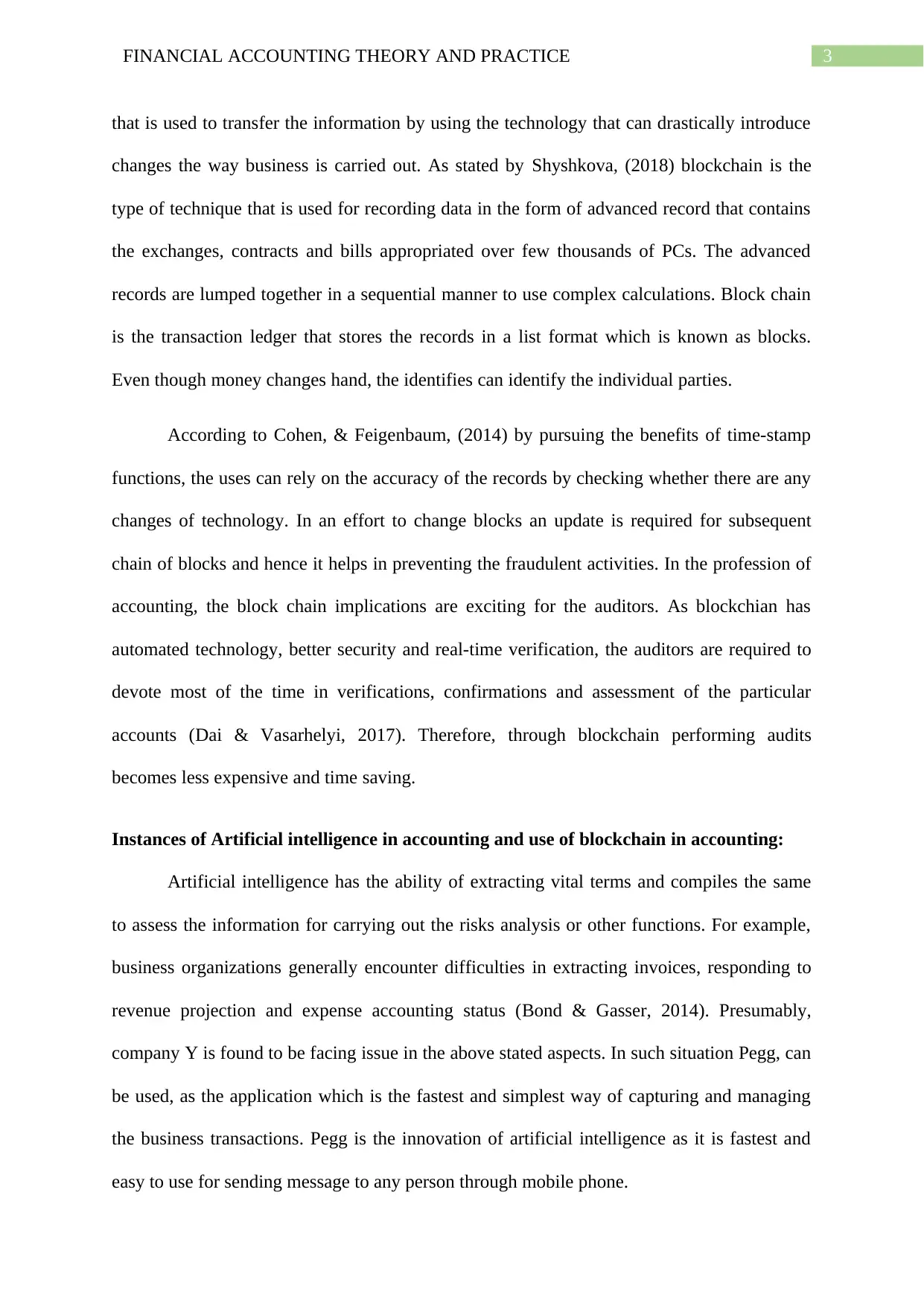
3FINANCIAL ACCOUNTING THEORY AND PRACTICE
that is used to transfer the information by using the technology that can drastically introduce
changes the way business is carried out. As stated by Shyshkova, (2018) blockchain is the
type of technique that is used for recording data in the form of advanced record that contains
the exchanges, contracts and bills appropriated over few thousands of PCs. The advanced
records are lumped together in a sequential manner to use complex calculations. Block chain
is the transaction ledger that stores the records in a list format which is known as blocks.
Even though money changes hand, the identifies can identify the individual parties.
According to Cohen, & Feigenbaum, (2014) by pursuing the benefits of time-stamp
functions, the uses can rely on the accuracy of the records by checking whether there are any
changes of technology. In an effort to change blocks an update is required for subsequent
chain of blocks and hence it helps in preventing the fraudulent activities. In the profession of
accounting, the block chain implications are exciting for the auditors. As blockchian has
automated technology, better security and real-time verification, the auditors are required to
devote most of the time in verifications, confirmations and assessment of the particular
accounts (Dai & Vasarhelyi, 2017). Therefore, through blockchain performing audits
becomes less expensive and time saving.
Instances of Artificial intelligence in accounting and use of blockchain in accounting:
Artificial intelligence has the ability of extracting vital terms and compiles the same
to assess the information for carrying out the risks analysis or other functions. For example,
business organizations generally encounter difficulties in extracting invoices, responding to
revenue projection and expense accounting status (Bond & Gasser, 2014). Presumably,
company Y is found to be facing issue in the above stated aspects. In such situation Pegg, can
be used, as the application which is the fastest and simplest way of capturing and managing
the business transactions. Pegg is the innovation of artificial intelligence as it is fastest and
easy to use for sending message to any person through mobile phone.
that is used to transfer the information by using the technology that can drastically introduce
changes the way business is carried out. As stated by Shyshkova, (2018) blockchain is the
type of technique that is used for recording data in the form of advanced record that contains
the exchanges, contracts and bills appropriated over few thousands of PCs. The advanced
records are lumped together in a sequential manner to use complex calculations. Block chain
is the transaction ledger that stores the records in a list format which is known as blocks.
Even though money changes hand, the identifies can identify the individual parties.
According to Cohen, & Feigenbaum, (2014) by pursuing the benefits of time-stamp
functions, the uses can rely on the accuracy of the records by checking whether there are any
changes of technology. In an effort to change blocks an update is required for subsequent
chain of blocks and hence it helps in preventing the fraudulent activities. In the profession of
accounting, the block chain implications are exciting for the auditors. As blockchian has
automated technology, better security and real-time verification, the auditors are required to
devote most of the time in verifications, confirmations and assessment of the particular
accounts (Dai & Vasarhelyi, 2017). Therefore, through blockchain performing audits
becomes less expensive and time saving.
Instances of Artificial intelligence in accounting and use of blockchain in accounting:
Artificial intelligence has the ability of extracting vital terms and compiles the same
to assess the information for carrying out the risks analysis or other functions. For example,
business organizations generally encounter difficulties in extracting invoices, responding to
revenue projection and expense accounting status (Bond & Gasser, 2014). Presumably,
company Y is found to be facing issue in the above stated aspects. In such situation Pegg, can
be used, as the application which is the fastest and simplest way of capturing and managing
the business transactions. Pegg is the innovation of artificial intelligence as it is fastest and
easy to use for sending message to any person through mobile phone.
Paraphrase This Document
Need a fresh take? Get an instant paraphrase of this document with our AI Paraphraser
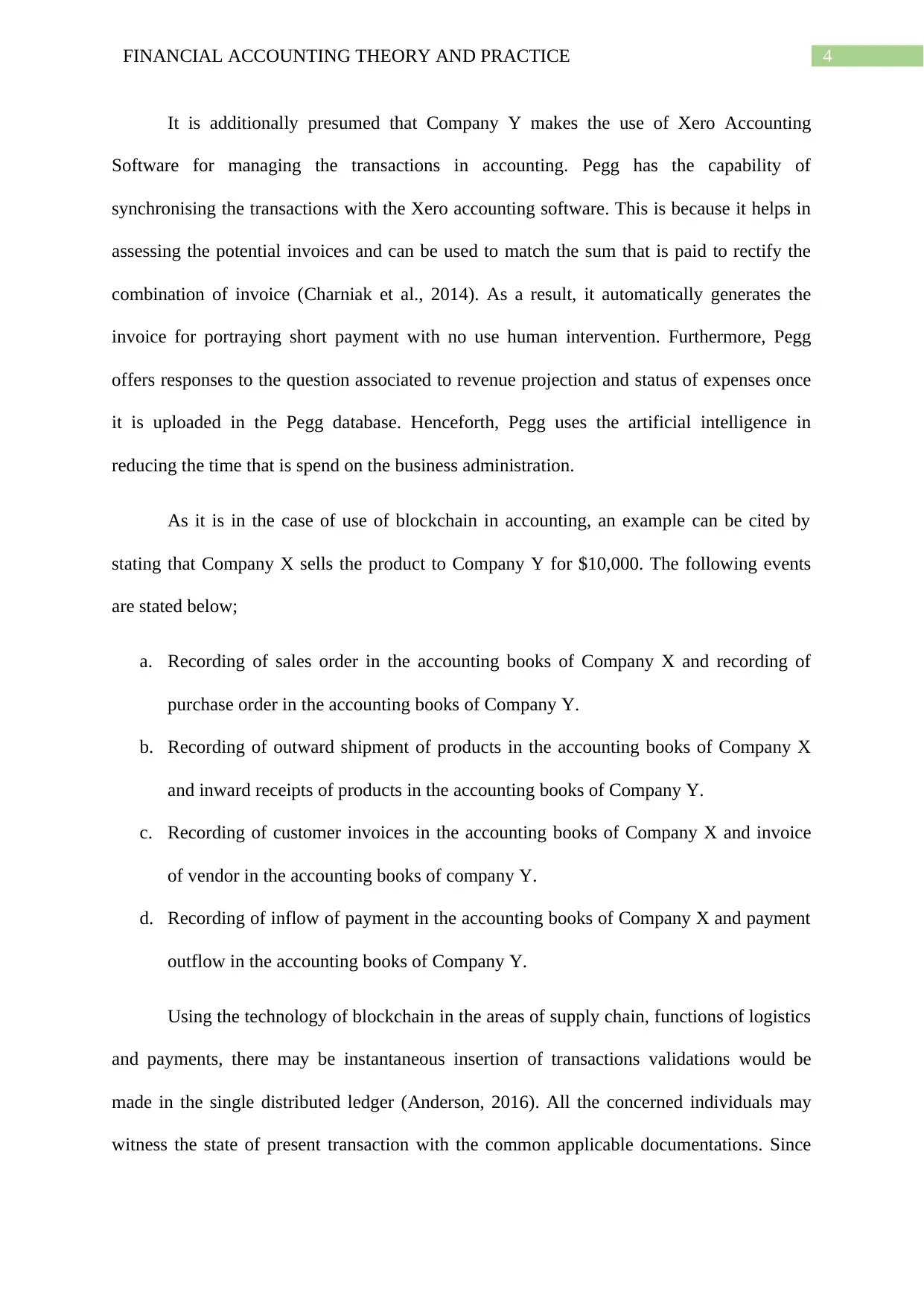
4FINANCIAL ACCOUNTING THEORY AND PRACTICE
It is additionally presumed that Company Y makes the use of Xero Accounting
Software for managing the transactions in accounting. Pegg has the capability of
synchronising the transactions with the Xero accounting software. This is because it helps in
assessing the potential invoices and can be used to match the sum that is paid to rectify the
combination of invoice (Charniak et al., 2014). As a result, it automatically generates the
invoice for portraying short payment with no use human intervention. Furthermore, Pegg
offers responses to the question associated to revenue projection and status of expenses once
it is uploaded in the Pegg database. Henceforth, Pegg uses the artificial intelligence in
reducing the time that is spend on the business administration.
As it is in the case of use of blockchain in accounting, an example can be cited by
stating that Company X sells the product to Company Y for $10,000. The following events
are stated below;
a. Recording of sales order in the accounting books of Company X and recording of
purchase order in the accounting books of Company Y.
b. Recording of outward shipment of products in the accounting books of Company X
and inward receipts of products in the accounting books of Company Y.
c. Recording of customer invoices in the accounting books of Company X and invoice
of vendor in the accounting books of company Y.
d. Recording of inflow of payment in the accounting books of Company X and payment
outflow in the accounting books of Company Y.
Using the technology of blockchain in the areas of supply chain, functions of logistics
and payments, there may be instantaneous insertion of transactions validations would be
made in the single distributed ledger (Anderson, 2016). All the concerned individuals may
witness the state of present transaction with the common applicable documentations. Since
It is additionally presumed that Company Y makes the use of Xero Accounting
Software for managing the transactions in accounting. Pegg has the capability of
synchronising the transactions with the Xero accounting software. This is because it helps in
assessing the potential invoices and can be used to match the sum that is paid to rectify the
combination of invoice (Charniak et al., 2014). As a result, it automatically generates the
invoice for portraying short payment with no use human intervention. Furthermore, Pegg
offers responses to the question associated to revenue projection and status of expenses once
it is uploaded in the Pegg database. Henceforth, Pegg uses the artificial intelligence in
reducing the time that is spend on the business administration.
As it is in the case of use of blockchain in accounting, an example can be cited by
stating that Company X sells the product to Company Y for $10,000. The following events
are stated below;
a. Recording of sales order in the accounting books of Company X and recording of
purchase order in the accounting books of Company Y.
b. Recording of outward shipment of products in the accounting books of Company X
and inward receipts of products in the accounting books of Company Y.
c. Recording of customer invoices in the accounting books of Company X and invoice
of vendor in the accounting books of company Y.
d. Recording of inflow of payment in the accounting books of Company X and payment
outflow in the accounting books of Company Y.
Using the technology of blockchain in the areas of supply chain, functions of logistics
and payments, there may be instantaneous insertion of transactions validations would be
made in the single distributed ledger (Anderson, 2016). All the concerned individuals may
witness the state of present transaction with the common applicable documentations. Since
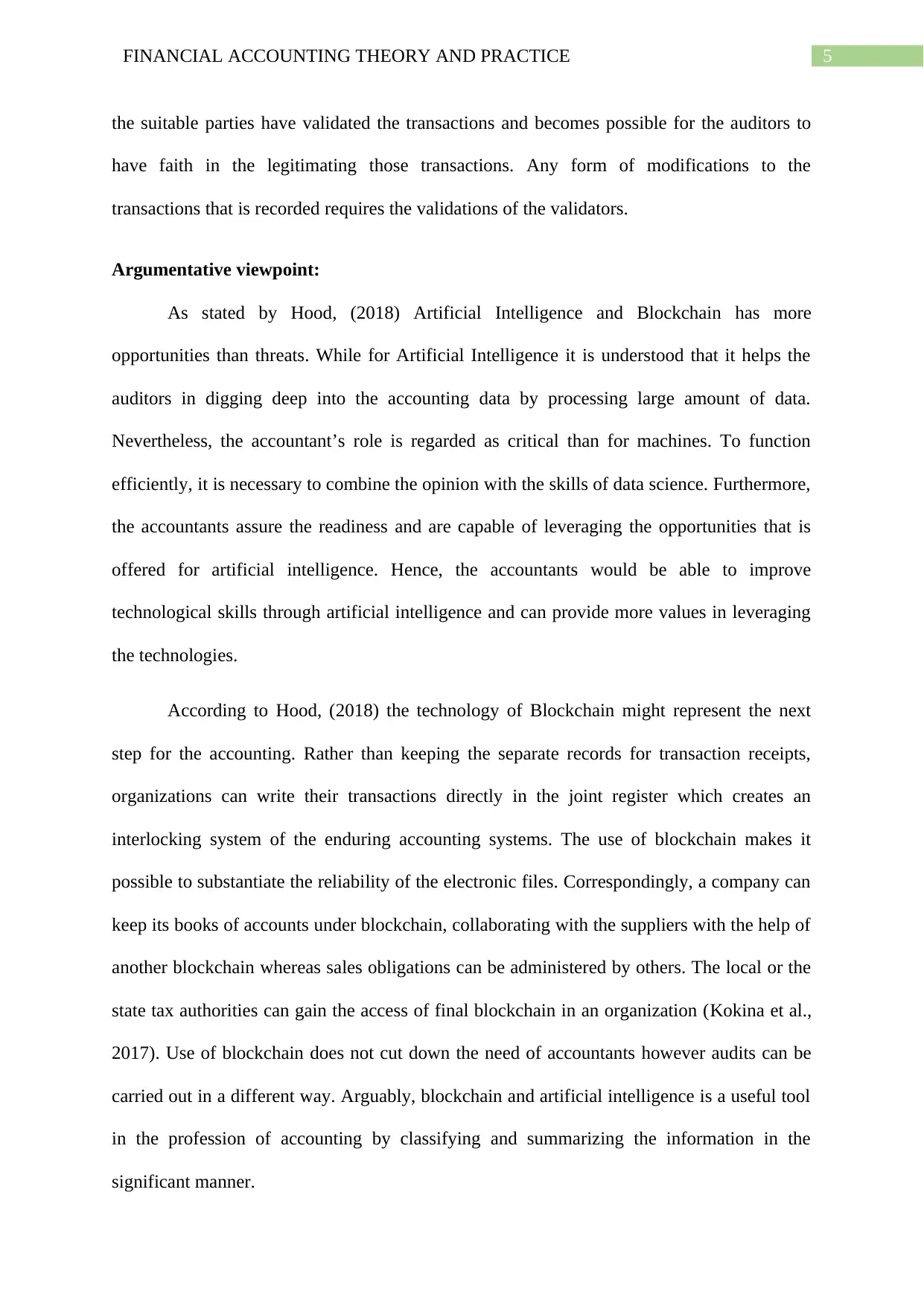
5FINANCIAL ACCOUNTING THEORY AND PRACTICE
the suitable parties have validated the transactions and becomes possible for the auditors to
have faith in the legitimating those transactions. Any form of modifications to the
transactions that is recorded requires the validations of the validators.
Argumentative viewpoint:
As stated by Hood, (2018) Artificial Intelligence and Blockchain has more
opportunities than threats. While for Artificial Intelligence it is understood that it helps the
auditors in digging deep into the accounting data by processing large amount of data.
Nevertheless, the accountant’s role is regarded as critical than for machines. To function
efficiently, it is necessary to combine the opinion with the skills of data science. Furthermore,
the accountants assure the readiness and are capable of leveraging the opportunities that is
offered for artificial intelligence. Hence, the accountants would be able to improve
technological skills through artificial intelligence and can provide more values in leveraging
the technologies.
According to Hood, (2018) the technology of Blockchain might represent the next
step for the accounting. Rather than keeping the separate records for transaction receipts,
organizations can write their transactions directly in the joint register which creates an
interlocking system of the enduring accounting systems. The use of blockchain makes it
possible to substantiate the reliability of the electronic files. Correspondingly, a company can
keep its books of accounts under blockchain, collaborating with the suppliers with the help of
another blockchain whereas sales obligations can be administered by others. The local or the
state tax authorities can gain the access of final blockchain in an organization (Kokina et al.,
2017). Use of blockchain does not cut down the need of accountants however audits can be
carried out in a different way. Arguably, blockchain and artificial intelligence is a useful tool
in the profession of accounting by classifying and summarizing the information in the
significant manner.
the suitable parties have validated the transactions and becomes possible for the auditors to
have faith in the legitimating those transactions. Any form of modifications to the
transactions that is recorded requires the validations of the validators.
Argumentative viewpoint:
As stated by Hood, (2018) Artificial Intelligence and Blockchain has more
opportunities than threats. While for Artificial Intelligence it is understood that it helps the
auditors in digging deep into the accounting data by processing large amount of data.
Nevertheless, the accountant’s role is regarded as critical than for machines. To function
efficiently, it is necessary to combine the opinion with the skills of data science. Furthermore,
the accountants assure the readiness and are capable of leveraging the opportunities that is
offered for artificial intelligence. Hence, the accountants would be able to improve
technological skills through artificial intelligence and can provide more values in leveraging
the technologies.
According to Hood, (2018) the technology of Blockchain might represent the next
step for the accounting. Rather than keeping the separate records for transaction receipts,
organizations can write their transactions directly in the joint register which creates an
interlocking system of the enduring accounting systems. The use of blockchain makes it
possible to substantiate the reliability of the electronic files. Correspondingly, a company can
keep its books of accounts under blockchain, collaborating with the suppliers with the help of
another blockchain whereas sales obligations can be administered by others. The local or the
state tax authorities can gain the access of final blockchain in an organization (Kokina et al.,
2017). Use of blockchain does not cut down the need of accountants however audits can be
carried out in a different way. Arguably, blockchain and artificial intelligence is a useful tool
in the profession of accounting by classifying and summarizing the information in the
significant manner.
⊘ This is a preview!⊘
Do you want full access?
Subscribe today to unlock all pages.

Trusted by 1+ million students worldwide
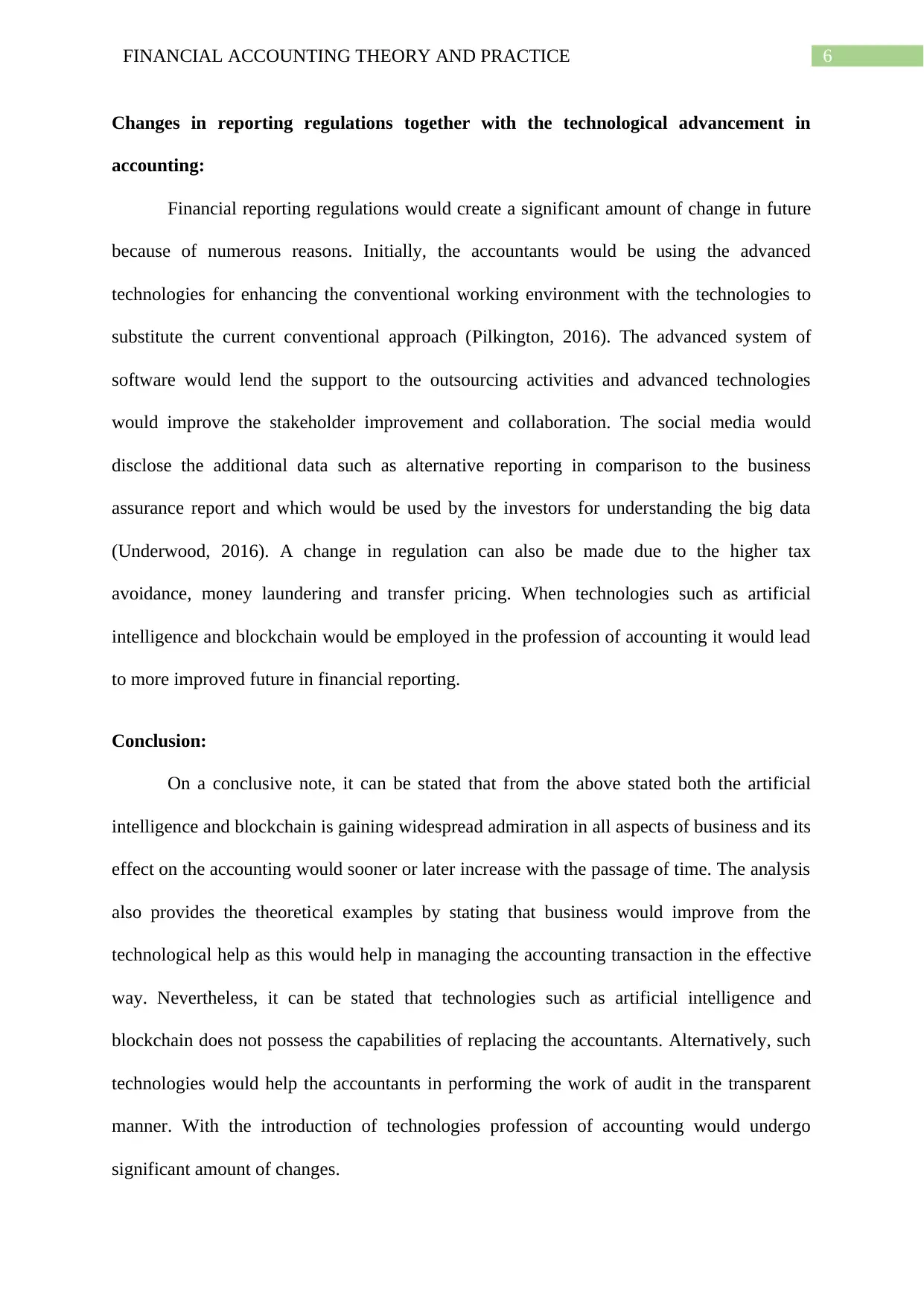
6FINANCIAL ACCOUNTING THEORY AND PRACTICE
Changes in reporting regulations together with the technological advancement in
accounting:
Financial reporting regulations would create a significant amount of change in future
because of numerous reasons. Initially, the accountants would be using the advanced
technologies for enhancing the conventional working environment with the technologies to
substitute the current conventional approach (Pilkington, 2016). The advanced system of
software would lend the support to the outsourcing activities and advanced technologies
would improve the stakeholder improvement and collaboration. The social media would
disclose the additional data such as alternative reporting in comparison to the business
assurance report and which would be used by the investors for understanding the big data
(Underwood, 2016). A change in regulation can also be made due to the higher tax
avoidance, money laundering and transfer pricing. When technologies such as artificial
intelligence and blockchain would be employed in the profession of accounting it would lead
to more improved future in financial reporting.
Conclusion:
On a conclusive note, it can be stated that from the above stated both the artificial
intelligence and blockchain is gaining widespread admiration in all aspects of business and its
effect on the accounting would sooner or later increase with the passage of time. The analysis
also provides the theoretical examples by stating that business would improve from the
technological help as this would help in managing the accounting transaction in the effective
way. Nevertheless, it can be stated that technologies such as artificial intelligence and
blockchain does not possess the capabilities of replacing the accountants. Alternatively, such
technologies would help the accountants in performing the work of audit in the transparent
manner. With the introduction of technologies profession of accounting would undergo
significant amount of changes.
Changes in reporting regulations together with the technological advancement in
accounting:
Financial reporting regulations would create a significant amount of change in future
because of numerous reasons. Initially, the accountants would be using the advanced
technologies for enhancing the conventional working environment with the technologies to
substitute the current conventional approach (Pilkington, 2016). The advanced system of
software would lend the support to the outsourcing activities and advanced technologies
would improve the stakeholder improvement and collaboration. The social media would
disclose the additional data such as alternative reporting in comparison to the business
assurance report and which would be used by the investors for understanding the big data
(Underwood, 2016). A change in regulation can also be made due to the higher tax
avoidance, money laundering and transfer pricing. When technologies such as artificial
intelligence and blockchain would be employed in the profession of accounting it would lead
to more improved future in financial reporting.
Conclusion:
On a conclusive note, it can be stated that from the above stated both the artificial
intelligence and blockchain is gaining widespread admiration in all aspects of business and its
effect on the accounting would sooner or later increase with the passage of time. The analysis
also provides the theoretical examples by stating that business would improve from the
technological help as this would help in managing the accounting transaction in the effective
way. Nevertheless, it can be stated that technologies such as artificial intelligence and
blockchain does not possess the capabilities of replacing the accountants. Alternatively, such
technologies would help the accountants in performing the work of audit in the transparent
manner. With the introduction of technologies profession of accounting would undergo
significant amount of changes.
Paraphrase This Document
Need a fresh take? Get an instant paraphrase of this document with our AI Paraphraser
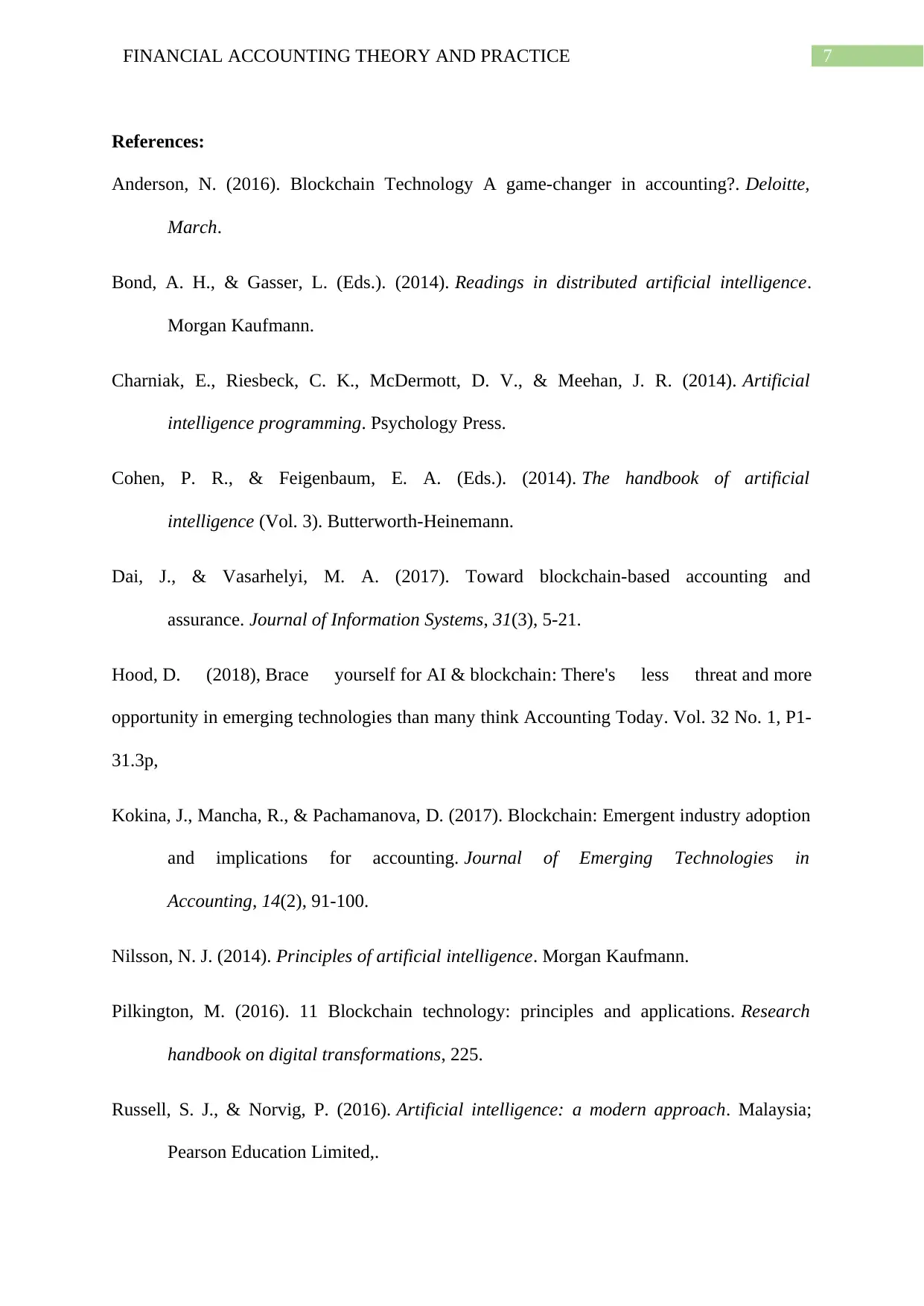
7FINANCIAL ACCOUNTING THEORY AND PRACTICE
References:
Anderson, N. (2016). Blockchain Technology A game-changer in accounting?. Deloitte,
March.
Bond, A. H., & Gasser, L. (Eds.). (2014). Readings in distributed artificial intelligence.
Morgan Kaufmann.
Charniak, E., Riesbeck, C. K., McDermott, D. V., & Meehan, J. R. (2014). Artificial
intelligence programming. Psychology Press.
Cohen, P. R., & Feigenbaum, E. A. (Eds.). (2014). The handbook of artificial
intelligence (Vol. 3). Butterworth-Heinemann.
Dai, J., & Vasarhelyi, M. A. (2017). Toward blockchain-based accounting and
assurance. Journal of Information Systems, 31(3), 5-21.
Hood, D. (2018), Brace yourself for AI & blockchain: There's less threat and more
opportunity in emerging technologies than many think Accounting Today. Vol. 32 No. 1, P1-
31.3p,
Kokina, J., Mancha, R., & Pachamanova, D. (2017). Blockchain: Emergent industry adoption
and implications for accounting. Journal of Emerging Technologies in
Accounting, 14(2), 91-100.
Nilsson, N. J. (2014). Principles of artificial intelligence. Morgan Kaufmann.
Pilkington, M. (2016). 11 Blockchain technology: principles and applications. Research
handbook on digital transformations, 225.
Russell, S. J., & Norvig, P. (2016). Artificial intelligence: a modern approach. Malaysia;
Pearson Education Limited,.
References:
Anderson, N. (2016). Blockchain Technology A game-changer in accounting?. Deloitte,
March.
Bond, A. H., & Gasser, L. (Eds.). (2014). Readings in distributed artificial intelligence.
Morgan Kaufmann.
Charniak, E., Riesbeck, C. K., McDermott, D. V., & Meehan, J. R. (2014). Artificial
intelligence programming. Psychology Press.
Cohen, P. R., & Feigenbaum, E. A. (Eds.). (2014). The handbook of artificial
intelligence (Vol. 3). Butterworth-Heinemann.
Dai, J., & Vasarhelyi, M. A. (2017). Toward blockchain-based accounting and
assurance. Journal of Information Systems, 31(3), 5-21.
Hood, D. (2018), Brace yourself for AI & blockchain: There's less threat and more
opportunity in emerging technologies than many think Accounting Today. Vol. 32 No. 1, P1-
31.3p,
Kokina, J., Mancha, R., & Pachamanova, D. (2017). Blockchain: Emergent industry adoption
and implications for accounting. Journal of Emerging Technologies in
Accounting, 14(2), 91-100.
Nilsson, N. J. (2014). Principles of artificial intelligence. Morgan Kaufmann.
Pilkington, M. (2016). 11 Blockchain technology: principles and applications. Research
handbook on digital transformations, 225.
Russell, S. J., & Norvig, P. (2016). Artificial intelligence: a modern approach. Malaysia;
Pearson Education Limited,.
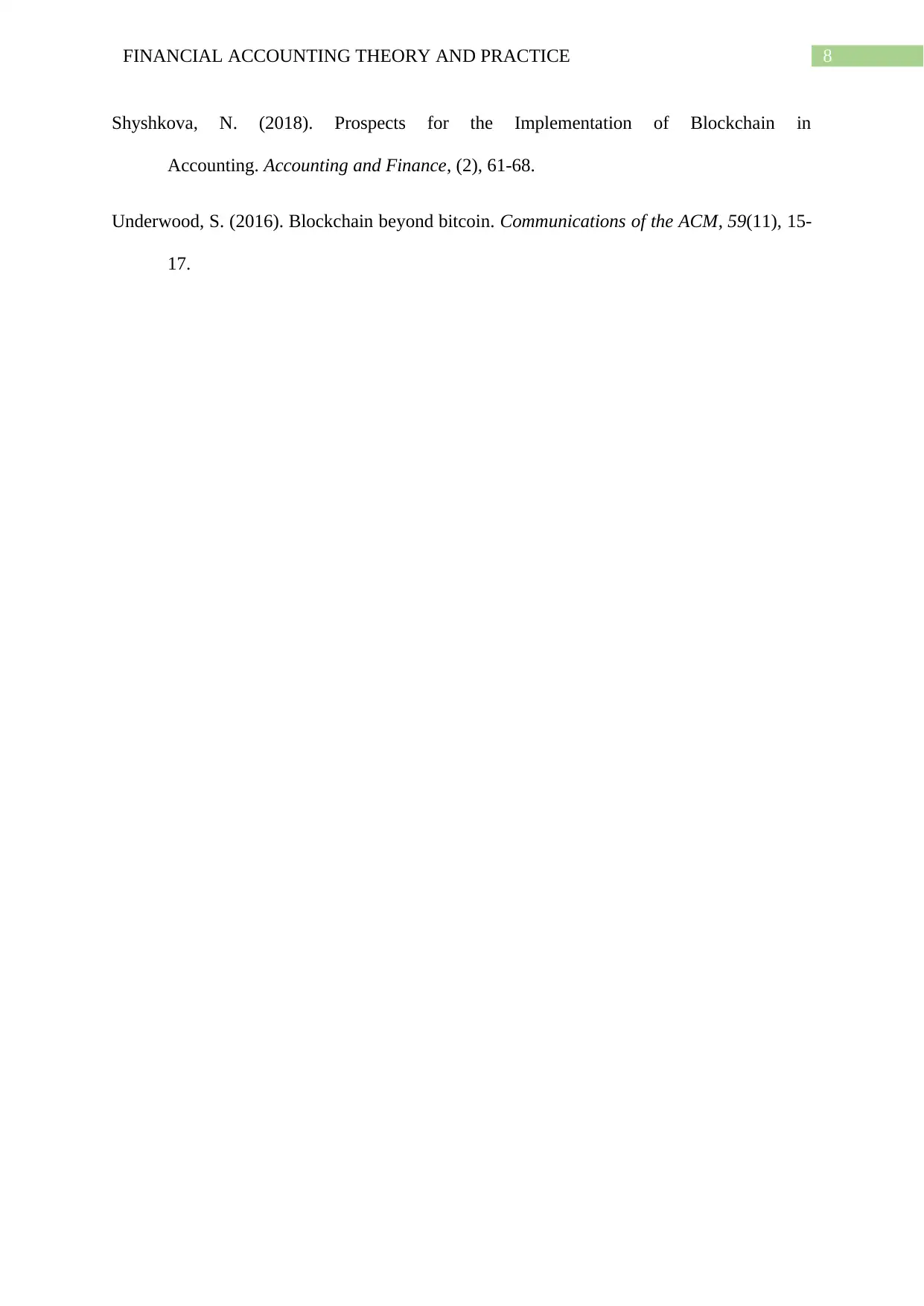
8FINANCIAL ACCOUNTING THEORY AND PRACTICE
Shyshkova, N. (2018). Prospects for the Implementation of Blockchain in
Accounting. Accounting and Finance, (2), 61-68.
Underwood, S. (2016). Blockchain beyond bitcoin. Communications of the ACM, 59(11), 15-
17.
Shyshkova, N. (2018). Prospects for the Implementation of Blockchain in
Accounting. Accounting and Finance, (2), 61-68.
Underwood, S. (2016). Blockchain beyond bitcoin. Communications of the ACM, 59(11), 15-
17.
⊘ This is a preview!⊘
Do you want full access?
Subscribe today to unlock all pages.

Trusted by 1+ million students worldwide
1 out of 9
Related Documents
Your All-in-One AI-Powered Toolkit for Academic Success.
+13062052269
info@desklib.com
Available 24*7 on WhatsApp / Email
![[object Object]](/_next/static/media/star-bottom.7253800d.svg)
Unlock your academic potential
Copyright © 2020–2026 A2Z Services. All Rights Reserved. Developed and managed by ZUCOL.

